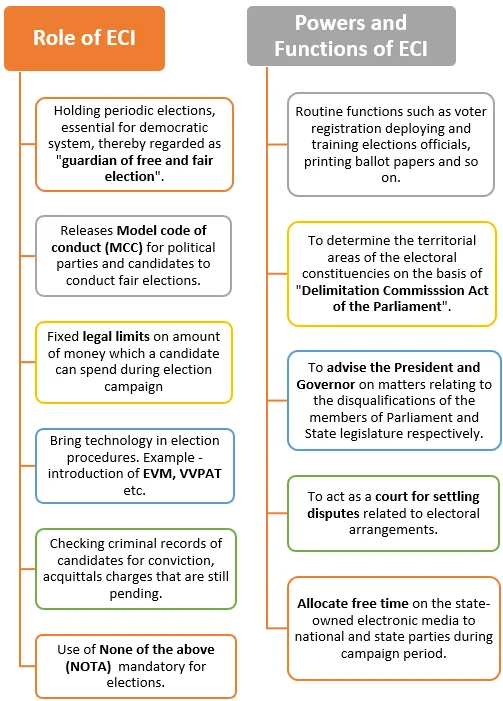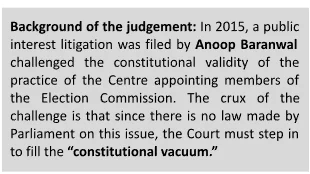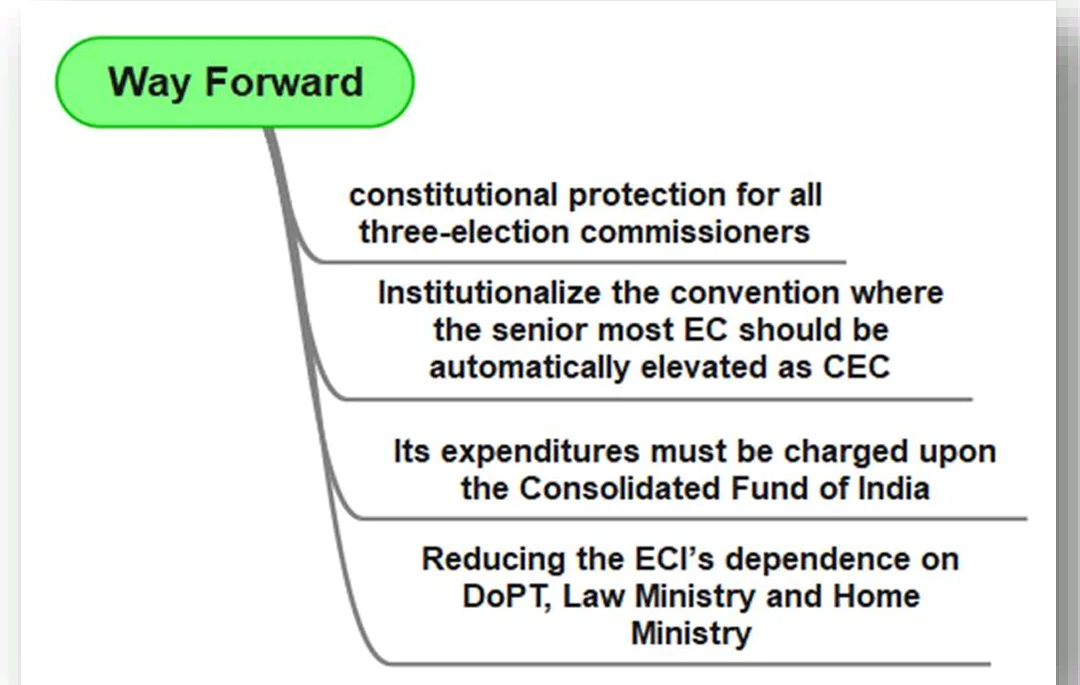The Election Commission of India (ECI) is a permanent and independent Constitutional body established under Article 324 of the Constitution. The ECI is provided with the power of superintendence, direction, and control of elections to the Lok Sabha, Rajya Sabha, State Legislative Assemblies, State Legislative Councils, and the offices of the President and Vice President of the country. It is not concerned with the elections of panchayats and municipalities in the states. For this, the Constitution of India provides for a separate State Election Commission.
The Election Commission of India
Composition of Election Commission of India
- Article 324 of the Constitution provides the following provisions with regard to the composition of the Election Commission:
- Members: The Election Commission shall consist of the Chief Election Commissioner and such number of other Election Commissioners, if any, as the President may from time to time fix.
- Single-Member Body Until 1989: Until 1989 the Election Commission functioned as a single-member body.
- Expansion in 1989: On 16 October 1989, the President appointed two more Election Commissioners to cope with the increased work of the Election Commission on account of the lowering of the voting age from 21 to 18 years.
- Reversion in January 1990: However, the two posts of Election Commissioners were abolished in January 1990 and the Election Commission was reverted to the earlier position.
- Multi-Member Body Since 1993: Again in 1993, the President appointed two more Election Commissioners. Since then and till today, the Election Commission has been functioning as a multi-member body consisting of one Chief Election Commissioner and two Election Commissioners.
Enroll now for UPSC Online Course
- Appointment: The appointment of the Chief Election Commissioner and other Election Commissioners shall be made by the President.
- When any other Election Commissioner is so appointed, the Chief Election Commissioner shall act as the Chairman of the Election Commission.
- The President may also appoint after consultation with the Election Commission such regional commissioners as he may consider necessary to assist the Election Commission.
- Conditions of Service and Tenure: Of the Election Commissioners and the regional commissioners shall be determined by the President.
- They hold office for a term of 6 years or until they attain the age of 65 years, whichever is earlier.
- They can resign at any time or can also be removed before the expiry of their term.
Electoral Process
- Presidential and Vice-Presidential Elections: The Indian Constitution provides the details of elections of only the President and the Vice President.
- Parliamentary Regulation of Elections: Article 327 empowers Parliament to regulate the powers and procedure of election to both houses of Parliament and the State Legislatures, including the preparation of electoral rolls, the delimitation of constituencies, and all other matters necessary for securing the due Constitution of such House or Houses.
- This power is subject to two conditions:
- There shall be no separate electorate.
- There shall be Universal Adult Suffrage
-
- State Legislature’s Power to Regulate Elections: Article 328 empowers the State Legislature to make provisions for election to either house of Legislature in so far as Parliament has not made provision on that behalf.
- Regulation of Service Conditions: To regulate the service conditions of the Election Commissioner and make rules for the transaction of business, Parliament enacted the Election Commission (Conditions of Service of Election Commissioners and Transaction of Business) Act, 1991.
- Some of the key features are as follows:
- Salary: There shall be paid to the Chief Election Commissioner [and other Election Commissioners] a salary which is equal to the salary of a Judge of the Supreme Court.
- Term of office: The Chief Election Commissioner or an Election Commissioner shall hold office for a term of six years from the date on which he assumes his office, but only until the age of 65.
- Disposal of business by Election Commission: The Election Commission may, by unanimous decision, regulate the procedure for the transaction of its business as well as the allocation of its business amongst the Chief Election Commissioner and other Election Commissioners.
-
- If the Chief Election Commissioner and other Election Commissioners differ in opinion on any matter, such matter shall be decided according to the opinion of the majority.
-

Removal of the Chief Election Commissioner and Other Election Commissioners
Chief Election Commissioner
- Protection from Removal: The Chief Election Commissioner is provided with the same level of protection from removal as a judge of the Supreme Court of India.
- Process of Impeachment: The CEC can only be removed from office through a process of impeachment.
- Adoption of Motion: This requires a motion of impeachment to be adopted by both the Lok Sabha and the Rajya Sabha, the two houses of the Parliament of India by a Special Majority (a majority of the total membership of the house and not less than two-thirds of the members present and voting).
- Grounds for Removal: The grounds for removal are specified as “Proved Misbehavior” or “Incapacity.” (Neither terms are defined in the Constitution.)
Other Election Commissioners
- Removal of Other Election Commissioners: The other Election Commissioners cannot be removed from office except on the recommendation of the Chief Election Commissioner.
- Difference in Protection Levels: The Constitution of India does not provide the same level of protection to the other Election Commissioners as it does to the CEC, reflecting the intention to ensure the CEC’s authority over the other commissioners to some extent.
- Supreme Court Judgment: The Supreme Court, in Anoop Baranwal’s judgment, upheld this disparity.
- Historical Context: It is worth noting that historically, no Chief Election Commissioner has ever been impeached in India, reflecting the strength of the democratic institutions in ensuring the tenure of Election Commissioners remains insulated from political interference.
Autonomy of the ECI
-
- Safeguards for Independent Functioning: Article 324 of the Constitution has made the following provisions to safeguard and ensure the independent and impartial functioning of the Election Commission:
- Security of Tenure: The Chief Election Commissioner cannot be removed from his office except in the same manner and on the same grounds as a judge of the Supreme Court.
- Thus, he does not hold his office till the pleasure of the President, though he is appointed by him.
- Any other Election Commissioner or a Regional Commissioner cannot be removed from office except on the recommendation of the Chief Election Commissioner.
- Invariable Service Condition: The service conditions of the Chief Election Commissioner cannot be varied to his disadvantage after his appointment.
- Bar to Interference by the Court:
-
- Validity of Delimitation Laws: The validity of any law relating to the delimitation of constituencies or the allotment of seats to such constituencies, made or purporting to be made under Article 327 or Article 328 shall not be called in question in any court.
- Election Disputes: No election to either House of Parliament or to either House of the Legislature of a State shall be called in question except by an election petition presented to such authority and in such manner as may be provided for by or under any law made by the appropriate Legislature.
Challenges to ECI’s Independence
The ability of ECI for independent and impartial exercise of its power is hindered by the following:
- No Prescribed Qualification: The Constitution has not prescribed the qualifications (legal, educational, administrative or judicial) of the members of the Election Commission. This may lead to the appointment of partisan, incapable or unskilled people.
- No Prescribed Term: The Constitution has not specified the terms of the members of the Election Commission.
- This may make ECI just another posting for a career bureaucrat.
- Allow Appointment After Post-retirement: The Constitution has not debarred the retiring Election Commissioners from any further appointment by the government.
- The lure of post-retirement benefits through postings in government bodies allows executive influence on ECI’s decision.
- No Power to De-register Political Parties: The Commission is not empowered to deregister a political party, which may lead to Political Parties indulging in activities like Caste-based rallies, distributing money or liquor and other nefarious acts.
- No Legal Backing to Model Code of Conduct (MCC): MCC is non-statutory in nature and hence Election Commission can’t take legal actions in most cases where it is flouted by the candidates.
- Lack of Independent Secretariat: Without an independent Secretariat, the Election Commission has to depend upon the Government for its clerical, officials and other staff members.
-
- The Goswami committee and The Supreme Court in Anoop Baranwal case implored upon the Government to address the lack of an independent secretariat.
- Lack of Financial Autonomy: ECI expenditure is not charged on the Consolidated Fund of India, making it dependent upon the Executive to secure funds.
Election Commission: The Need for Evolution in the Appointment Process and Bolstering Its Autonomy
Supreme Court (SC) on the Appointment of ECs:
- Judgement: A five-judge bench of the Supreme Court in March 2023, unanimously ruled that the members of ECI should be elected by a high-power committee consisting of:
- The Prime Minister,
- Leader of Opposition in Lok Sabha, and
- The Chief Justice of India.
- Other Related Judgements:
-
- Supreme Court Ruling on Removal Process: On the process of removal of Election Commissioners, the Court ruled that it must not be the same as it is for the Chief Election Commissioner (CEC).
- The Supreme Court stated that while there may be equality in other aspects between the Chief Election Commissioner and the Election Commissioners concerning various matters dealt with under the Act, it is important to recognize that, in law, Article 324 is inoperable without the Chief Election Commissioner.
- Supreme Court Ruling on Removal Process: On the process of removal of Election Commissioners, the Court ruled that it must not be the same as it is for the Chief Election Commissioner (CEC).

- Need for Independent Secretariat: The Court left it to the government.
- The SC ruled that there is an urgent need to provide for a permanent Secretariat and also to provide that the expenditure be charged on the Consolidated Fund of India and it is for the Union of India to consider bringing in the much-needed changes seriously.
- In response to this SC judgement, the government has proposed the Chief Election Commissioner and Other Election Commissioners (Appointment, Conditions of Service and Term of Office) Bill, 2023 to bring changes in various provisions related to the body.
The Chief Election Commissioner and Other Election Commissioners (Appointment, Conditions of Service and Term of Office) Bill, 2023
It replaces the Election Commission (Conditions of Service of Election Commissioners and Transaction of Business) Act, 1991.
- Novel Features of the Bill:
- The members will be appointed by the President, upon the recommendation of the Selection Committee comprising – The Prime Minister, Cabinet Minister, and Leader of Opposition in Lok Sabha (or leader of the single largest opposition party).
- A Search Committee headed by the Cabinet Secretary will suggest five names to the Selection Committee. The Selection Committee may consider names other than those suggested as well.
- Eligibility criteria: The CEC and ECs must: (i) be persons of integrity, (ii) have knowledge and experience in the management and conduct of elections, and (iii) be or have been Secretary (or equivalent) to the government.
- Salary and pension: It will be equivalent to that of the Cabinet Secretary.
- Key Issues and Challenges with the Bill
- Selection Criteria: It may be dominated by the Executive, which has implications for its independence.
- Concerns Over Selection Committee Recommendations: Selection Committee’s recommendations to be valid in spite of vacancy or defect in the Constitution may effectively lead to a monopoly of Government members in selecting candidates, particularly when the Lok Sabha is dissolved.
- Reduced Status: Making the CEC and EC’s salary equivalent to the Cabinet Secretary may lead to government influence as it is fixed by the government.
- Further, CECs and ECs also perform quasi-judicial functions and limiting these posts to senior bureaucrats may exclude other suitable candidates.
Other Challenges with the ECI
- Use of EVM and VVPAT, an Issue of Transparency: Use of these technologies has become a matter of concern regarding trust in the Election Commission of India (ECI).
- Although, time and again ECI has addressed it, it needs to make an error and doubt-free process by conducting regular checks and trials.
- Challenges in Ensuring Intra-party Democracy: Section 29A of the RPA Act, requires political parties to submit documents on organisational structure, office-bearers and their appointment, terms and powers & duties of office-bearers, organisational elections, etc.
- However, due to lack of express provision for enforcing internal democratic functioning of political parties, and lack of power to de-register parties, the issue of criminalisation of politics, money and muscle power arises.
- Lack of Parity in the Removal of ECs and CEC: Only the CEC enjoys the same status of the removal process as that of judges of the Supreme Court (SC).
- The ECs can be removed on the CEC’s recommendation.
- There is a good case for extending the same tenure security to the ECs too.

| Articles involved with the Election Commission of India | |
| Article 324 | Superintendence, direction, and control of elections to be vested in an Election Commission. |
| Article 325 | No person to be ineligible for inclusion in, or to claim to be included in a special, electoral roll on grounds of religion, race, caste, or sex. |
| Article 326 | Elections to the House of the People and to the Legislative Assemblies of States to be on the basis of adult suffrage. |
| Article 327 | Power of Parliament to make provisions with respect to elections to Legislatures. |
| Article 328 | Power of Legislature of a State to make provisions with respect to elections to such Legislature. |
| Article 329 | Bar to interference by courts in electoral matters. |
Enroll now for UPSC Online Course
| Must Read | |
| Current Affairs | Editorial Analysis |
| Upsc Notes | Upsc Blogs |
| NCERT Notes | Free Main Answer Writing |
Conclusion
The ECI is vital to maintain the robust electoral framework of the country.
- In this light, it is imperative to bring comprehensive reforms in order to enable the ECI to continue to work in a fair and free manner.
- There is a need to fine-tune the balance between the autonomy of the body and Government involvement related to recruitment and other key dimensions.
Sign up for the PWOnlyIAS Online Course by Physics Wallah and start your journey to IAS success today!
| Related Articles | |
| Election Commission of India: Its Members, Power and Functions | Supreme Court |
| Empowering and Reforming the State Election Commissions | Appointment of Election Commissioners |

 GS Foundation
GS Foundation Optional Course
Optional Course Combo Courses
Combo Courses Degree Program
Degree Program











